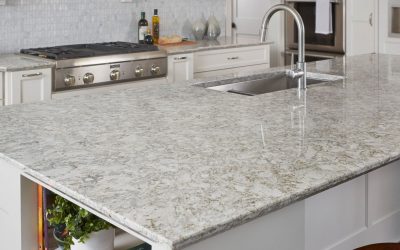
Cambria’s countertop products are made of the finest quartz. They are distinctively durable, nonabsorbent, and easy to maintain. Quartz is one of the hardest minerals on Earth. Because of its strength and abundance, quartz is a popular and reliable choice for countertops. Quartz countertops are sometimes referred to as “engineered” or “man-made,” but quartz is in fact a natural stone. The amount of natural quartz in a slab depends on the quartz manufacturer. Cambria is among the highest concentration of pure quartz to ensure strong, compact slabs.
Quartz Pros and Cons
- One of the main benefits of quartz countertops is that they are extremely durable.
- Quartz countertops never have to be sealed, unlike granite, marble, and other surfaces that require regular maintenance.
- Quartz countertops are also nonabsorbent, so they resist staining and don’t harbor harmful bacteria.
- Homeowners and designers also turn to quartz for its versatile and beautiful designs, colors, and patterns.
- Quartz countertops are scratch resistant, but due to their hardness they may dull a knife that is used directly on the surface.
- Like all natural stone countertops, quartz can be damaged by sudden changes in temperature. Pot holders and trivets should be used to protect a quartz countertop from anything hot.
- Though quartz countertops are not approved for outdoor use, quartz may be used in outdoor kitchens with full overhead coverage from the elements.
Quartz vs Granite
Quartz countertops are stronger than granite countertops. Quartz is an extremely hard mineral. Granite also absorbs liquids and stains, while quartz is completely nonabsorbent. Quartz countertops are maintenance free. Granite countertops need to be sealed and polished regularly. In addition, quartz can be fabricated for use in many unique applications that are not possible with granite or other stones.
Quartz vs Marble
Quartz countertops are much more durable than marble countertops. Marble scratches and stains easily, while quartz countertops resist scratching and staining. Marble countertops require frequent maintenance, but quartz countertops never need to be sealed or polished. Unlike marble, quartz is nonabsorbent, so staining liquids and harmful bacteria are never absorbed. In addition, acidic foods like lemon can cause etching on marble countertops, which is never a concern with quartz.
Quartz vs Concrete
Unlike quartz, concrete is not a natural stone. Concrete is a mixture of water, cement, and an aggregate of sand or gravel. Concrete countertops are porous, susceptible to stains, and require sealing. Quartz countertops do not absorb liquids, do not stain, and never require maintenance. Concrete countertops are sometimes touted as a DIY project, but they are extremely heavy and difficult to install. When purchased from reputable companies and retailers, quartz countertops are installed in a smooth, expert process by professionals.
Quartz vs Soapstone
Quartz countertops are significantly more durable than soapstone countertops. Soapstone countertops etch and scratch easily and must be oiled regularly to maintain their appearance. Quartz countertops are scratch resistant and do not require any maintenance. Soapstone countertops have a soft, powdery feel to the touch and their appearance can change or darken over time. High-quality quartz countertops will maintain the same appearance over time without any upkeep.
Related Posts
All About Quartz Countertops and 4 of the Latest Cambria Designs…
Cambria’s countertop products are made of the finest quartz. They are distinctively durable, nonabsorbent, and easy to maintain. Quartz is one of the hardest minerals on Earth. Because of its strength and abundance, quartz is a popular and reliable choice for...
Contact us (859-331-8100) for a Complimentary Consultation!
What Our Clients Are Saying...
(859) 331-8100
W. Stephens Cabinetry & Design
2497 Dixie Highway
Ft. Mitchell, KY 41017
Quick Links
Copyright © 2021 W.Stephens Cabinetry & Design
Internet Presence by Main Street Marketing


